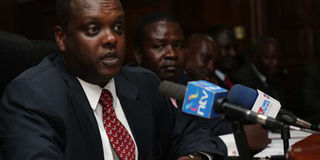Graft agency blames ministry for sports woes

Sports Cabinet Secretary Hassan Wario appears before the Senate Labour and Social Welfare Committee on February 9, 2016, to provide insight on the delayed Harambee Stars trip to Cape Verde. Transparency International has said the ministry is to blame for the worrying state of the sector. PHOTO | WILLIAM OERI | NATION MEDIA GROUP
What you need to know:
- The country is now under threat of missing out on the 2016 Olympics if it doesn’t convince the World Anti-doping Agency (Wada) within two months that it has enhanced checks against doping.
- Conversely, the Ministry has shielded itself from accusations of sleeping on the job by shifting blame on the Ethics and Anti-Corruption Commission (EACC).
- Last year, six Kenyan athletes were banned after tests revealed they had used performance enhancement drugs, bringing the total to 43, since 2012.
The Sports Ministry has come under intense criticism on Monday for allowing the sector to deteriorate, following doping and corruption allegations.
At the launch of a new report on corruption in sport, Transparency International-Kenya Chairman Richard Leakey condemned the government officials for turning a blind eye, something he said could ruin Kenya’s heritage.
“It is, to me, tragic that in areas such as sport which since independence have represented Kenya’s image and is Kenya’s most important outreach, we face issues and when we come to present a report, our government officials are not present,” he said adding that “It is, to me, a great shame. It is ruining our country in so many ways. Sport is now being tarnished.”
Dr Leakey, who also chairs the Kenya Wildlife Service, was speaking at the launch of The Global Corruption Report prepared by Transparency International (TI).
The chairman took the issue up with Sports, Culture and the Arts Cabinet Secretary Hassan Wario for what he said they had ignored a “big challenge,” referring to the emergency of doping claims among Kenyan athletes.
The country is now under threat of missing out on the 2016 Olympics if it doesn’t convince the World Anti-doping Agency (Wada) within two months that it has enhanced checks against doping.
Last year, six Kenyan athletes were banned after tests revealed they had used performance enhancement drugs, bringing the total to 43, since 2012.
One of them accused Athletics Kenya officials of demanding bribe so her ban could be shortened. However, the body denied the charge but AK CEO Isaac Mwangi stepped aside for investigations to be carried out.
BILLION DOLLAR INDUSTRY
Conversely, the Ministry has shielded itself from accusations of sleeping on the job by shifting blame on the Ethics and Anti-Corruption Commission (EACC).
“I wish to state that corruption is not a government policy, it is anti-corruption,” said Mr Martin Wekesa who read Dr Wario’s speech.
“Corruption has two sides, the demand side and the supply side. And while the demand side can be attributed to the government, the corporate sector is the supplier. The best strategy is to focus on both sides,” he argued, adding the government has been demanding accountability from sports managers.
The report is the first by TI to specifically look into graft in global sport. It assesses sports administration, sports financing, events planning and match-fixing -- which is where the vice strikes.
TI says that with global sporting events generating at least $145 billion a year, it makes sports attractive to corruption but with limited checks.
On awarding of hosting rights for instance, the report says the selection process for bids, the courting of international delegates and the use of high-priced consultants for global bidding are the entry points.
Meanwhile, outgoing Fifa President Sepp Blatter and Uefa President Michel Platini will be appealing the eight-year bans on February 22.
Blatter was found guilty of breaking Fifa Code of Ethics on conflict of interests and it was also ruled by Ethics judges that Platini had equally broken the conflict of interest rules.
The verdicts by the Ethics judges earned both of them eight-year bans.
Additionally, nine former global football management officials have been indicted by the US for corruption related offences.
Though representatives from athletics, rugby, Kenya Premier League, The National Olympic Committee of Kenya (NOCK) and the Africa Centre for Open Governance (Africog) were present,





